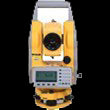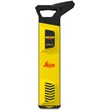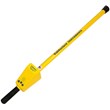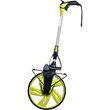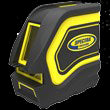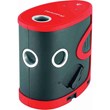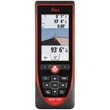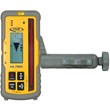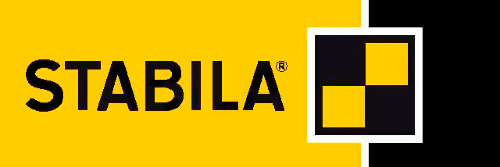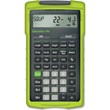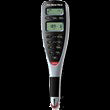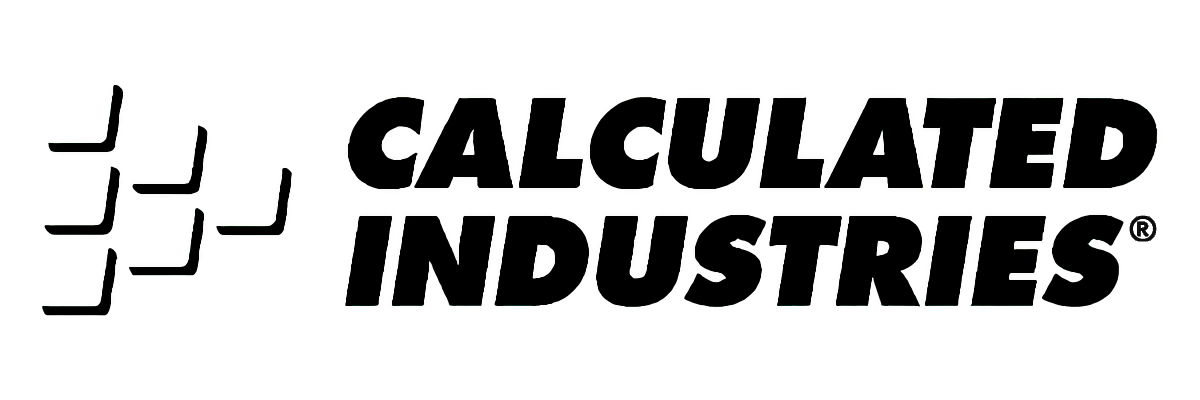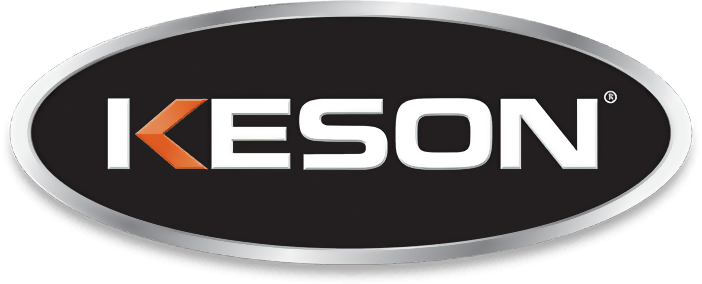Builder's Transit Levels
Filters
-
Transit Level NSLP500B Package
Northwest Instrument1 reviewOriginal price List Price: $325.00You Save: $36.40Original price $325.00 - Original price $325.00Original price List Price: $325.00Current price $288.60$288.60 - $288.60Current price $288.60| /- For leveling, measuring angles and plumb
- 200 foot range
- 1/4-inch at 100 feet accuracy
- 20x magnification
- ± 45-degree vertical angle
- 360-degree horizontal circle
- Includes tripod and aluminum rod
- Clamps and tangents
- IP54 dust and water protection
- 5/8 x 11 tripod thread
Original price List Price: $325.00You Save: $36.40Original price $325.00 - Original price $325.00Original price List Price: $325.00Current price $288.60$288.60 - $288.60Current price $288.60| /Sold out -
Siteline Builders Level - NSL100B
Northwest InstrumentNo reviewsOriginal price List Price: $215.00You Save: $35.60Original price $215.00 - Original price $215.00Original price List Price: $215.00Current price $179.40$179.40 - $179.40Current price $179.40| /- For leveling and measuring angles
- 200 foot range
- 1/4-inch at 100 feet accuracy
- 20x magnification
- 360-degree horizontal circle
- Eyepiece with fixed cross hairs
- Three leveling screws and leveling vial
- Rubber lens jacket
- IP54 dust and water protection
- 5/8 x 11 tripod thread
Original price List Price: $215.00You Save: $35.60Original price $215.00 - Original price $215.00Original price List Price: $215.00Current price $179.40$179.40 - $179.40Current price $179.40| /Sold out
Transit Levels Buyer's Guide
Whether you're laying the groundwork for a new building, mapping out land boundaries, or installing utilities, transit levels are essential tools for accurate and efficient measurements. This comprehensive guide provides in-depth knowledge about transit levels, how they work, the different types available, and how to choose the right one for your needs and help you navigate the world of transit levels.
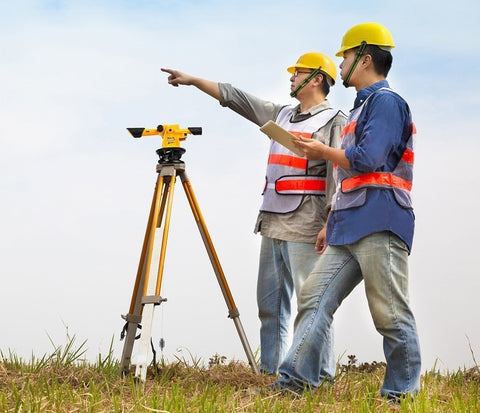
What is a Transit Level?
Transit levels, also referred to as transit tools, levels and transits, or surveyor levels, are precision optical instruments used to measure vertical and horizontal angles. It's a key surveying equipment that helps with leveling surfaces, determining slopes, and aligning structural elements.
Key Components of Transit Levels
A transit level’s functionality relies on several critical components that work together to provide accurate measurements:
- Telescope: The main optical element that allows users to sight distant objects. It includes crosshairs for accurate alignment and magnifies the target for clarity. With its ability to rotate horizontally and tilt vertically, the telescope enables precise angle and elevation measurements.
- Leveling Vials: These are bubble levels, usually in circular (bullseye) and tubular designs, that ensure the instrument is perfectly horizontal or vertical. Even minor tilts can cause errors in measurements.
- Horizontal and Vertical Circles: The horizontal circle measures angles around the instrument's base, while the vertical circle measures angles of elevation or depression. These graduated scales are essential for determining slopes and angles with precision.
- Tripod: The tripod provides a stable platform to mount the transit level. With adjustable legs, it ensures the instrument remains steady even on uneven terrain. A secure and well-leveled tripod is foundational to accurate readings.
- Focusing Knob: This component adjusts the clarity of the view through the telescope, ensuring both the crosshairs and the target are sharply visible. Proper focus eliminates visual errors and enhances the precision of measurements.
- Tangent Screws: These fine adjustment knobs allow users to align the telescope precisely with the target point. Tangent screws provide the micro-movements needed for ultimate accuracy.
- Plumb Bob: A simple but vital component, the plumb bob ensures that the instrument is directly centered over the desired survey point. This alignment is critical for accuracy, particularly in detailed site surveys.
- Base Plate and Leveling Screws: The base plate connects the instrument to the tripod, while the leveling screws allow users to make small adjustments to achieve perfect alignment with the bubble vials.
- Sunshade: A helpful addition, the sunshade minimizes glare on the telescope lens, improving visibility and ease of use during bright daylight conditions.
- Vernier Scales: Found on some advanced models, these allow for even finer measurements of horizontal and vertical angles by dividing smaller increments than the main scales can measure.
Types of Transit Levels
Transit levels come in three main types, each designed for specific needs. Understand each type to choose the right surveying equipment for your needs.
Builder's Level (Dumpy Level)
Builder’s level, also known as dumpy level or builder's level transit, is a survey equipment primarily used for horizontal leveling tasks. They have a fixed telescope that moves only horizontal and are ideal for general construction projects requiring elevation measurements, such as laying foundations or installing decks.
Transit Level
Transit levels, sometimes simply called transits, measure both horizontal and vertical angles. The telescope can rotate horizontally and tilt vertically, allowing for a broader range of applications, including grading, angle measurements, and complex surveying tasks.
Automatic Level (Auto Level)
Automatic levels, or auto levels, are optical instruments featuring an internal compensator that automatically adjusts the line of sight to a true level position. This self-leveling capability simplifies the setup process and reduces human error. Auto levels are ideal when quick and accurate leveling is required.
How does a Transit Level work?
Understanding how a transit level operates ensures precise measurements:
- Level the Instrument:Use the built-in leveling vials (bubble levels) and leveling screws to ensure the instrument is perfectly horizontal.
- Sight the Target: Look through the telescope, which magnifies distant objects, to align the crosshairs with a specific point or object. The telescope can rotate horizontally (360 degrees) and tilt vertically (up to 45 degrees).
-
Adjust the Axes:
- Horizontal Axis: Rotate the telescope horizontally to measure horizontal angles between different points.
- Vertical Axis: Tilt the telescope vertically to measure angles of elevation or depression.
-
Read Measurements:
- Horizontal Axis: Read the graduated scale on the horizontal circle to determine horizontal angles.
- Vertical Axis: Read the scale on the vertical axis to measure vertical angles or elevations.
- Recording Data: o Document all measurements for analysis and use in your project.
Common Applications of Transit Levels
Transit levels are versatile surveying tools used in various fields:
- Land Surveying: Measuring property boundaries, topographical features, and preparing sites for development.
- Construction Projects: Establishing level foundations, aligning structural components, and setting grades for proper drainage.
- Road Building: Determining elevations and slopes to design roads that meet safety and engineering standards.
- Utility Installation: Laying pipes, cables, and other utilities at correct depths and angles to ensure functionality and compliance with regulations.
How to Set Up a Transit Level
Setting up a transit level correctly ensures accurate measurements:
- Position the Tripod: Place the tripod over the survey point, spreading the legs wide for stability. Adjust the legs so that the tripod head is roughly level.
- Attach the Transit Level: Secure the instrument to the tripod using the mounting screw, ensuring it's firmly attached.
- Level the Instrument: Use the leveling screws to adjust the instrument until the bubble in the circular vial is centered. This ensures the base is level.
- Fine-tune Leveling with Tubular Vials: Adjust the leveling screws while observing the tubular (spirit) vials to achieve precise leveling along both axes.
- Check the Level: Rotate the instrument 180 degrees to confirm that it remains level in all directions. Readjust if necessary.
- Align the Telescope: Use the tangent screws to finely adjust the telescope's position, aligning it precisely with the target point.
How to Focus a Transit Level
Proper focusing is essential for clear vision and accurate readings:
- Adjust the Eyepiece: Rotate the eyepiece to bring the crosshairs into sharp focus against a light background. This adjustment compensates for your eyesight.
- Focus on the Target: Aim the telescope at the target object and use the focusing knob to sharpen the image. Both the target and crosshairs should appear crisp.
- Eliminate Parallax: Move your eye slightly up and down while looking through the eyepiece. If the crosshairs appear to move over the target, refocus until there's no apparent movement, ensuring accurate alignment.
Common Challenges and How to Overcome Them
Using transit levels are precise surveying tools but can encounter challenges. Here’s how to address them:
1. Unstable Setup on Uneven Terrain: Adjust the tripod legs individually to accommodate uneven ground. Ensure each leg is firmly planted and the tripod head is approximately level before fine-tuning with the leveling screws.
2. Poor Visibility: Use a high-contrast target or reflective surface to improve visibility. Instruments with illuminated reticles can improve visibility in low-light conditions.
3. Calibration Issues: Regularly check the calibration of your transit level, especially after transporting it. Perform a two-peg test to assess accuracy and adjust as necessary according to the manufacturer's instructions.
4. Parallax Error: Eliminate parallax by adjusting the eyepiece until the crosshairs remain stationary relative to the target, regardless of eye movement.
5. Environmental Factors: Shield the instrument from wind by using a windbreak. Allow the instrument to acclimate to outdoor temperatures to prevent thermal expansion affecting components.
How to Choose the Right Transit Level
Selecting the appropriate transit level depends on your specific needs:
1. Accuracy Requirements: For tasks demanding high precision, such as detailed surveying or large-scale construction, choose a transit level with higher magnification (e.g. 22x) and finer scale graduations.
2. Durability: If you'll be working in harsh environments or rugged terrains, then opt for models such David White LT6-900 known for robust construction and weather resistance.
3. Budget: Determine your budget while considering that higher-priced models often offer enhanced features, better accuracy, and longer lifespans. If you are looking for an affordable option then we recommend Johnson Level 22X.
4. Compatibility: Ensure the transit level is compatible with standard tripods, leveling rods, and other surveying equipment you may already own or plan to use.
Top Transit Levels from Leading Brands
Choosing the right transit level is crucial for ensuring reliability, accuracy, and performance. Here’s a closer look at the industry’s best options:
Northwest Instrument NSLP500B
The Northwest Instrument NSLP500B is a professional-grade transit level known for its precision and rugged construction. Its standout features include:
- Magnification: 20X, allowing for clear and detailed sighting over long distances.
- Laser Plummet: Ensures pinpoint accuracy for centering over survey points, saving time during setup.
- Durability: Built to withstand harsh environments, making it ideal for heavy-duty construction tasks and rugged fieldwork.
- Applications: Perfect for grading, slope measurement, and structural alignment projects.
Professionals appreciate its reliability and ability to perform consistently even in demanding conditions. The NSLP500B is a trusted choice for surveyors and engineers who prioritize accuracy.
David White LT6-900 Meridian 22X Optical Level-Transit
The David White LT6-900 Meridian offers a combination of simplicity and precision, making it suitable for both seasoned professionals and beginners. Its key features include:
- Magnification: 22X, delivering clear views of distant targets for detailed measurements.
- Construction: Die-cast housing ensures durability while maintaining a lightweight design for portability.
- Versatility: Smooth horizontal and vertical movements enable precise angle and slope measurements.
- Ease of Use: The straightforward setup process makes it ideal for users at any experience level.
This transit level is highly regarded for its balance of user-friendly features and dependable performance, making it an excellent choice for grading, foundation work, and complex layout tasks.
Johnson Level 22X Builder's Transit Level
Designed with affordability and ease of use in mind, the Johnson Level 22X Builder’s Transit Level is perfect for contractors and builders handling routine leveling tasks. Key features include:
- Magnification: 22X, delivering clear views of distant targets for detailed measurements.
- Graduations: Die-cast housing ensures durability while maintaining a lightweight design for portability.
- Simplicity: Smooth horizontal and vertical movements enable precise angle and slope measurements.
- Durability: The straightforward setup process makes it ideal for users at any experience level.
This model is best suited for general construction tasks, including foundation alignment, fence grading, and deck leveling. Its simplicity and reliability make it a popular option among professionals on a budget.
Frequently Asked Questions
Q: How Do You Calculate Transit Depth?
A: Calculating transit depth involves determining the vertical distance between two points using a transit level and a leveling rod. Here's how you can do it:
- Set Up the Transit Level: Position the instrument on a tripod between the two points whose depth difference you want to measure.
- Take the First Reading: Have an assistant hold the leveling rod vertically on the first point (Point A). Look through the transit level and note the measurement where the crosshair intersects the rod.
- Take the Second Reading: Repeat the process with the leveling rod on the second point (Point B).
- Calculate the Difference: Subtract the lower reading from the higher reading to determine the difference in elevation. This value represents the transit depth between the two points.
This process is essential in excavation, foundation work, and any construction activity requiring precise depth measurements.
Q: What Is the Difference Between a Transit Level and a Theodolite?
A:While both are optical instruments used in surveying, there are key differences:
- Transit Level: Primarily designed for leveling and measuring basic horizontal and vertical angles. It offers moderate precision and is suitable for general construction and surveying tasks.
- Theodolite: A more advanced instrument capable of measuring horizontal and vertical angles with high precision. Theodolites often come with vernier scales or digital displays for exact readings and are used in applications requiring meticulous angular measurements, such as large-scale mapping and engineering projects.
Q: How Do Transit Levels Differ from Other Surveying Tools?
A: Transit levels differ from other surveying tools in functionality and complexity:
- Optical Levels: Basic optical levels (also known as dumpy levels or builder's levels) are used solely for establishing a horizontal plane. They cannot measure vertical angles.
- Transit Levels: Can measure both horizontal and vertical angles, offering more versatility than basic optical levels but less precision than advanced instruments.
- Total Stations: Integrate electronic distance measurement and angle measurement, providing high precision and digital data output for complex surveying tasks.
- Laser Levels: Emit a laser beam to establish a level line over a distance but do not measure angles.
Q: What's the Difference Between a Transit Level and a Dumpy Level?
A: A transit level can rotate horizontally and tilt vertically, allowing it to measure vertical angles in addition to leveling. A dumpy level, also known as a builder’s level, is designed primarily for horizontal leveling tasks and can only rotate horizontally.
Q: Can I Use a Transit Level for Grading Purposes?
A: Yes, transit levels are well-suited for grading tasks. They allow you to measure elevation changes and slopes accurately, which is essential for designing proper drainage systems, laying foundations, and ensuring surfaces are level or inclined as required.
Q: How Often Should I Calibrate My Transit Level?
A: It's recommended to calibrate your transit level at least once a year or whenever you notice inconsistencies in your measurements. Regular calibration ensures that the instrument maintains its precision.
Q: What Is the Maximum Distance a Transit Level Can Accurately Measure?
A: The maximum effective range of a transit level depends on the model and its optical capabilities. Generally, most transit levels can provide accurate readings up to 200 to 300 feet.
Q: Is It Difficult for Beginners to Use a Transit Level?
A: While transit levels require some learning to operate effectively, many models are designed with user-friendly features to assist beginners.
Q: Can Transit Levels Be Used at Night or in Low-Light Conditions?
A:Using a transit level in low-light conditions can be challenging due to visibility issues. However, some transit levels come equipped with illuminated reticles or can be used alongside external lighting to improve visibility. Always ensure the target is well-lit, and the instrument's crosshairs are visible for accurate measurements.
Q: Are There Digital Transit Levels Available?
A: Yes, digital or electronic transit levels are available. These instruments incorporate digital displays and electronic measurement capabilities, offering increased accuracy and additional features like data storage, angle calculation, and integration with other digital surveying tools. They can simplify the measurement process and reduce human error.
Care and Maintenance of Transit Levels
Proper care extends the life of your transit level and maintains its accuracy:
- Regular Cleaning: After each use, wipe down the instrument with a soft, dry cloth to remove dust, dirt, and moisture. Avoid touching the lenses with your fingers.
- Protective Storage: Store the transit level in its protective case when not in use. Keep it in a dry, temperature-controlled environment to prevent damage from humidity or extreme temperatures.
- Calibration Checks: Periodically verify the instrument's calibration, especially before critical projects. Consult the manufacturer's guidelines or a professional service if adjustments are needed.
- Handle with Care: Transport the instrument carefully, avoiding drops or impacts that could misalign sensitive components. Use padded cases and secure it during transit.
- Avoid Exposure to Hard Consitions: While transit levels are built for fieldwork, excessive exposure to rain, dust storms, or corrosive environments can degrade performance. Use protective covers when necessary.
Explore Tiger Supplies range of top-quality transit levels and optical instruments or contact us today for expert advice. Our team is ready to help you find the perfect surveying tool to meet your needs and take your work to the next level.

